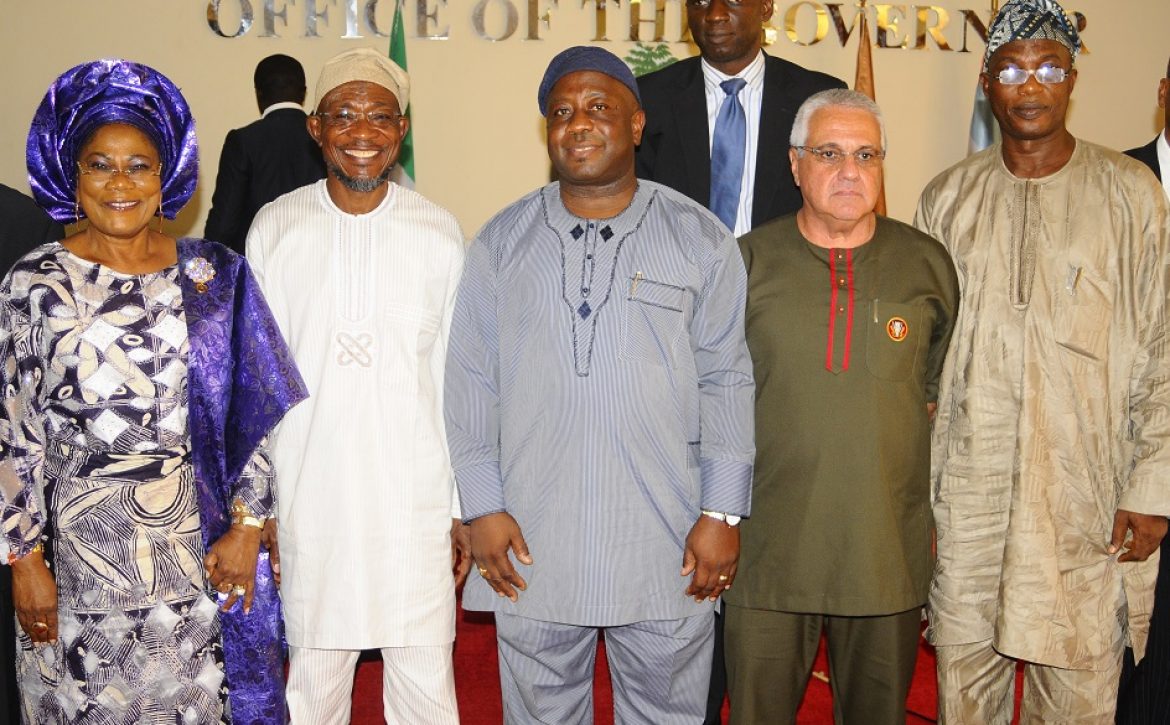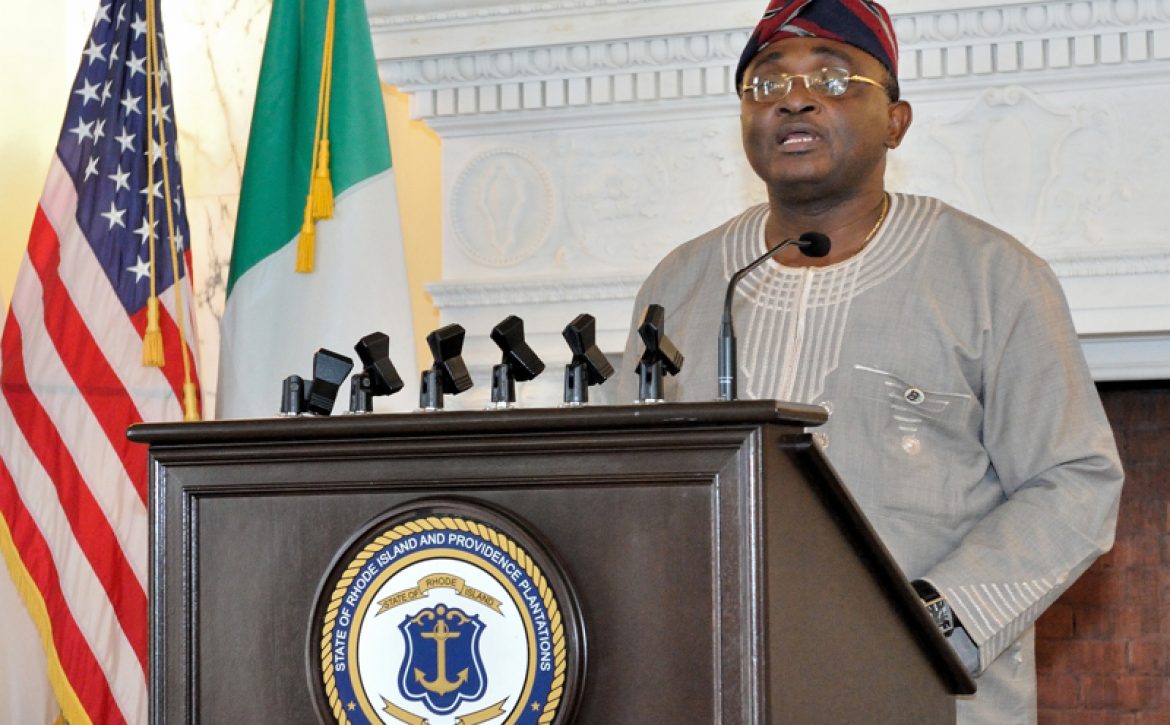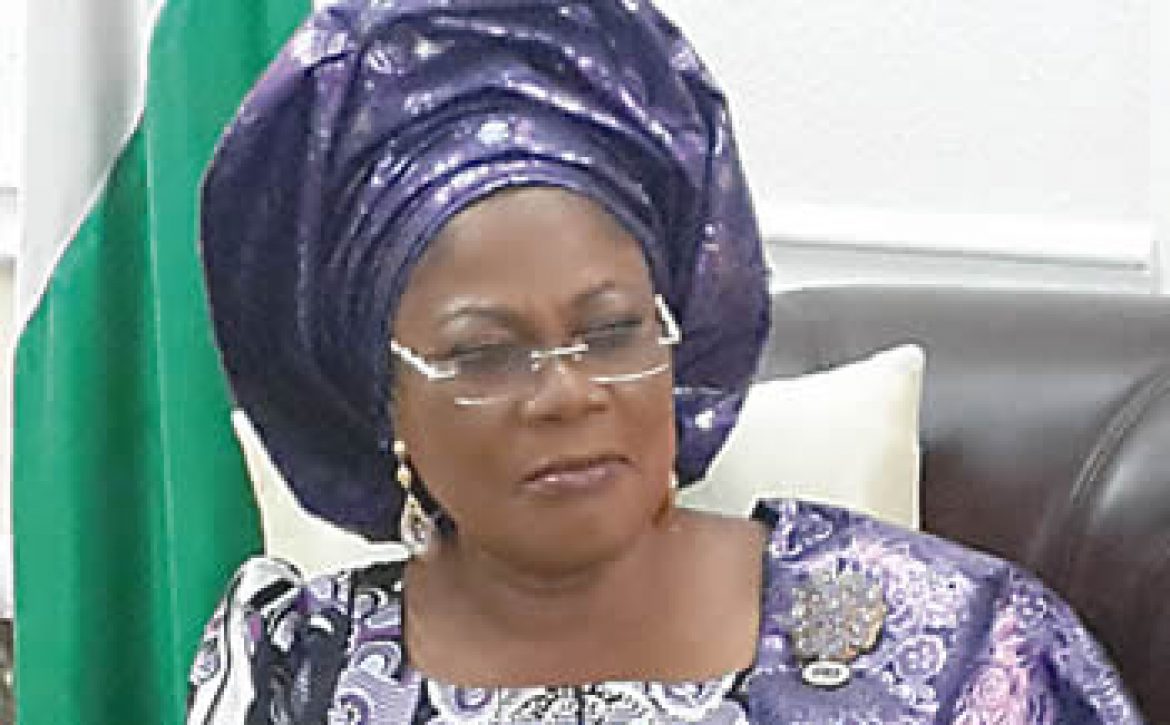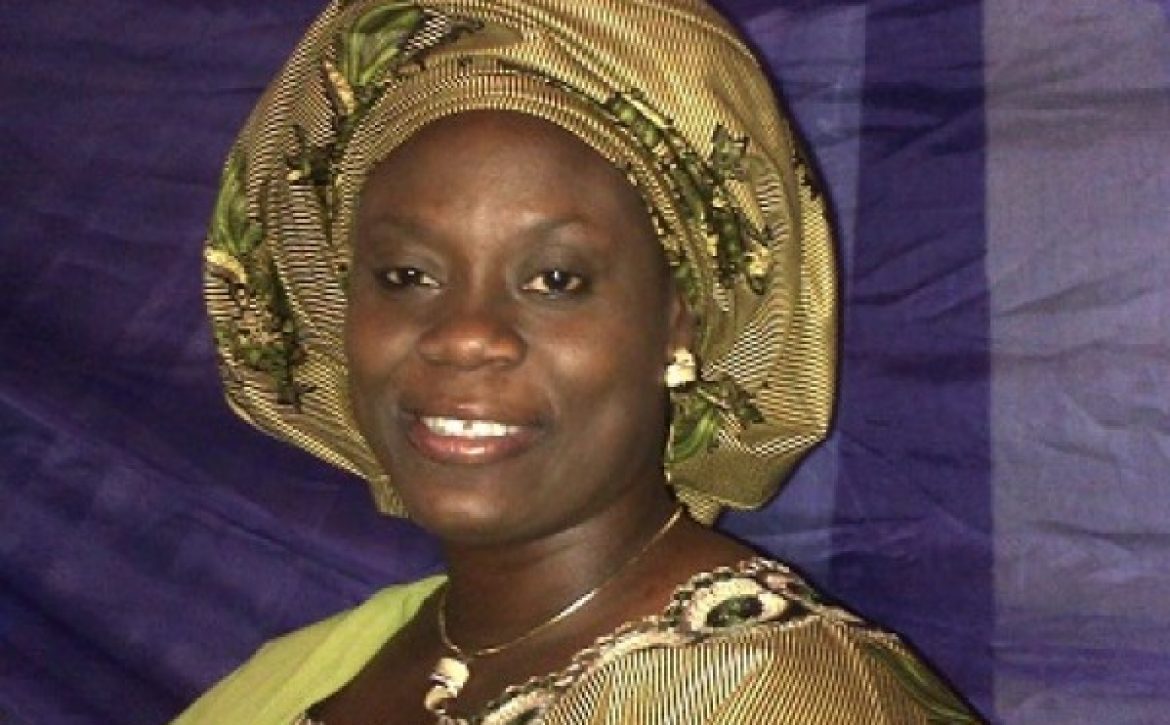
Governor Rauf Aregbesola has promised students in the state public schools that they will soon get school buses to ease transportation in line with the school reform agenda of his administration.
The governor gave his word at the 5th edition of ‘Gbangbadekun’, a town hall meeting programme held at Ikirun, headquarters of Ifelodun Local Council. The event was witnessed by a mammoth crowd made up of students market men and women, farmers, traditional rulers.
The remarkable thing about the programme held on Tuesday at the Akinorun Grammar School Playing Field was the students of secondary Schools in the constituency who trooped out en masse to express their appreciation to the governor over what they described as landmark development in the education sector of the state.
A cross section of the students gave kudos to Aregbesola for the on-going education reforms and reclassification aimed at securing their future.
The traditional rulers praised Aregbesola for his numerous achievements in the last thre years, just as they unanimously assured him of their support to continue beyond 2014.
Governor Rauf Aregbesola in his response charged all sectors of the community to take advantage of the various innovations in the state, by subscribing to the various projects of the state and key into it saying that the purpose of the gathering is to let the governed have their say in governance.
While thanking the people of Ikirun and other communities that made the Ifelodun/Odo Otin Federal Constituency for the love shown him and their warm reception, Aregbesola assured that all the requests and observations of all residents of the constituency who spoke at the event has been noted and will be taken care of.
On how to actualize the good plans of his administration in terms of developmental programmes in the State, the governor appealed to the people of the state especially private organizations to pay their tax as means of contribution to the rebuilding process of the state government.
Aregbesola who said Federal allocation being received from the Federal Government recently was not encouraging noted that his administration now generates 1.6 billion naira monthly as against the 300 million naira his administration met.
According to him, his target is to increase the State’s internally generated revenue to five million naira monthly which he said would reduce dependence on Federal allocation.
He disclosed that buses that would convey public schools students across the state would be released before the end of the month, and also pledged to pay bursary of the state’s indigenes who are in higher institutions across the country.
Aregbesola threatened to cancel the contract of any contractor working on road project in the area who fails to hasten his work in the next one week.
The governor said he would not rest on his oars on finding ways to to promote communal peace among the various communities in the state, while assuring the people that efforts are on to make sure that violence engendered by boundary and land disputes become a thing of the past in the state.
The event which was attended by members of the state’s executive council also afforded people of the area including traditional rulers to express their minds.
BIOREPORTS
Category: News
 Gov. Rauf Aregbesola of Osun on Thursday signed a Memorandum of Understanding (MOU) with the management of International Breweries in Ilesa aimed at expanding the company’s activities.
Gov. Rauf Aregbesola of Osun on Thursday signed a Memorandum of Understanding (MOU) with the management of International Breweries in Ilesa aimed at expanding the company’s activities.
Aregbesola, while signing the MoU in Osogbo, said that the MoU would boost the operations of the company in the state.
He promised that the state government would create enabling environment for willing investors from within and outside to industrialise the state.
“Our administration has taken different steps to turn around the fortunes of the state economically which I considered as a giant step.
“ We thank the management of International Breweries Plc for selecting the state for the investment over all other states of the federation,’’ he said.
“The collaboration of the IB Plc will help to create about 150,000 direct and indirect jobs in the state.’’
The Chairman of the company, Mr Michael Daramola, commended the efforts of Aregbesola to transform the state industrially.
Daramola said that this informed the decision of the company to expand its scope of operations in the state.
The News Agency of Nigeria (NAN) reports that Aregbesola signed the MoU on behalf of the state government, while Daramola signed on behalf of the company.
BUSINESSNEWS
 Rural dwellers in Osun State have been advised to maintain hygienic and healthy living by drinking potable water always, do away with open defecation and wash their hands with soap and water before eating.
Rural dwellers in Osun State have been advised to maintain hygienic and healthy living by drinking potable water always, do away with open defecation and wash their hands with soap and water before eating.
Osun State governor, Mr. Rauf Aregbesola, stated this while receiving a team of the European Union Water Supply and Sanitation Sector Reform Programme (EU-WSSSRP), who were on a monitoring mission of some EU projects in the state.
Represented by his deputy, Mrs Titilayo Laoye-Tomori, Governor Aregbesola expressed his pleasure to have team in the state at this time when his administration was working relentlessly to open up accessible roads in the rural areas for easy transportation of farm produce from rural to urban centres so as to make life conducive to all and sundry.
While appreciating EU for its efforts in bettering the lot of Africans, he implored the team to improve on their impact in the state through the provision of toilet facilities, potable water, good laboratory equipment and sensitisation on the importance of hand washing.
In his response, leader of the delegation, Mr Uiaus Sautsch, commended the state government for the creation of the Ministry of Water Resources, Rural Development and Community Affairs together with the prompt payment of its counterpart funding for EU-Unicef programmes in the state.
He assured that EU was poised at assisting more communities in the state, saying Odo-Otin and Ayedaade local government areas of the state had been selected to benefit from the provision of water and sanitation projects, coupled with Hilux vehicle, which had been donated to each of the council.
The team later carried out an inspection work to sites of some completed boreholes with a pledge for new ones and fixed N3 million for EU projects in Olokuku’s palace, Ekoosin and Igbaye communities all in Odo-Otin Local Government Area of the state.
TRIBUNE

No fewer than 320 accident victims are being rescued on monthly basis by the government of the State of Osun through the O Ambulance scheme.
The General Manager of the O Ambulance Scheme, Dr Akinloye Adeleke disclosed this on Tuesday in Osogbo at the opening ceremony of a two -day capacity building workshop organised by the Ministry of Health in collaboration with a United Kingdom South-East Coast Ambulance Service.
According to Dr Adeleke, who described the O Ambulance scheme as a laudable initiative of Governor Rauf Aregbesola, the service has greatly reduced loss of lives on the roads, as accident victims are being given first aid treatment by the O’Ambulance paramedics.
Dr Adeleke stated that the essence of the workshop is to further train the O Ambulance paramedics, who are drawn from the Osun Youths Empowerment Scheme (OYES) on effective accident rescue and emergency treatment.
He stressed that the workshop is aimed at developing the skills and efficiency of the paramedics, saying; “their efficiency is very important because they are dealing with lives.’
Dr Adeleke said about 400 paramedics are currently working in the O Ambulance service, while 92 of them, who are the first batch, are participating in the two -day workshop.
With the training, Dr Adeleke said the paramedics are expected to perform better, more confident and efficient.
Earlier, the Commissioner for Health, Mrs Temitope Ilori said the workshop was to further enhance the output and service delivery of the O Ambulance paramedics.
Dr Ilori explained that the workshop is very important as there is need to continuously train and re-train the paramedics for better performance.
She said the purpose of the O Ambulance scheme is to enable the road users to feel safe on the highways.
According to her: “The O Ambulance scheme was launched in February and the OYES paramedics were trained to rescue accident victims and give them first aid treatment.
“We need to continue the training. We believe that continuous training will further enhance their service delivery hence we are collaborating with trainers from the ambulance service in the UK to organize the workshop. We also consulted surgeons and medical doctors from Nigeria for the training.
“The State government of Osun is committed to the reduction of accidents on the highways in osun and save lives as part of the cardinal plan of the governor.
“ The participants are expected to improve on their service delivery after the training. The government is also empowering the participants with the training, as the workshop will enhance job opportunity.”
Delivering a lecture on Organogram and Operational Strategy of an Effective Ambulance Service, a medical practitioner from the United Kingdom South-East Coast Ambulance Service, Mr Malcolm Finn, commended Governor Aregbesola for establishing the O Ambulance.
Finn described the scheme as an initiative of a governor that cares for the well being of his people. He however, urged the government to make the O Ambulance service a career for the paramedics, instead of being Ad-Hoc staff.
OSUNNEWS

Femi Ifaturoti LL.B (HONS) B.L, FCIArb is the Director General of Bureau of Social Services (BOSS) and also a Special Adviser to the Executive Council, State of Osun,He is a graduate of University of Ife (1979) and was called to the Bar in 1980. He started his law practice in the chambers of H O Davies, QC and has litigation experience covering nearly all facets of the law for a period of at least 30 years. Ifaturoti is also a fellow, Chartered Institute of Arbitration.
His post-graduation professional trainings include Alternative Dispute Resolution (ADR), Mediation Skills Training (MST) organized by ADR Centre with NCMG & NIPC a World Bank Sponsored project (August 20 – 24, 2009), Centre for Effective Dispute Resolution (CEDR) UK Mediator Skills Training (June, 2005), NCMG ADR Pre-certification course – practical skills in Negotiation, Mediation and Arbitration CEDR (April, 2005), Solicitors Law Seminar and Exhibition (Law Society of England) at “The Barbican” (June, 1989).
He was one of the Nigerian delegates to the 7-Day International Seminar on SOCIAL POLICIES FOR DEVELOPMENT in Brasilia, Brazil August 2012. He also attended a two-week intensive training in MONITORING AND EVALUATION FOR RESULTS under the auspices of IMA International, Institute of Development Studies and University of Sussex at Brighton England in June 2013.
He is a Member of Panel of Neutrals at the Lagos Multi-door Courthouse and a faculty member of NCMG/Bond University Australia Negotiation Centre Lagos Negotiation College Ikoyi.
He was in the Legal Team of the Election Petition of Ogbeni Rauf Aregbesola Governor, State of Osun up to Appellate Court. He has been a member, Editorial Board of Osun Defender since inception and is also Chairman, Implementing Committee Osun Youth Empowerment Scheme (OYES).
He is a member of several Professional and Civil Society Associations including Negotiation and Conflict Management Group (NCMG), International Bar Association, Nigerian Bar Association (NBA), International Bar Association (IBA) and New Culture Group – an NGO dedicated to good governance, leadership, accountability and social justice.
For more on BOSS, please visit www.o-boss.org
 Constant and effective training of school administrators has been described as a major prerequisite towards attaining efficient and effective service delivery in the education sector, the deputy governor of the State of Osun, Mrs Grace Titi Laoye-Tomori, has said.
Constant and effective training of school administrators has been described as a major prerequisite towards attaining efficient and effective service delivery in the education sector, the deputy governor of the State of Osun, Mrs Grace Titi Laoye-Tomori, has said.
Mrs Laoye-Tomori stated this in Osogbo, while declaring open a three-day workshop organised for school leaders and administrators in the State.
The deputy governor, who is also the state Commissioner for Education, said the present administration in the state places high premium on training and re-training of its work force with a view to imparting them with knowledge and skills needed to bring out the best in them.
She noted that the state government was aiming to achieve rapid transformation in the state’s education sector through the distribution of Opon-Imo, O-Meal and construction of state of the art high, middle and elementary schools.
While noting that constant training of school administrators and heads would have multiplier and positive effects on the students in public schools, Mrs Laoye-Tomori charged teachers and other stakeholders in the educational sector to explore the opportunities of the workshop to shore up their knowledge and potentials.
In his remark, the Permanent Secretary in the state’s Ministry of Education, Mr Lawrence Oyeniran, said leadership and management training was an essential tool in the development of the education sector.
He said the training was targeted at assisting school managers to clearly identify their roles as administrators and help them to improve on quality of teaching, learning and service delivery in school environment.
In her remark, the Chief Executive Officer and founder of the International Centre for Leadership and Entrepreneur Development, Dr Olajumoke Familoni, whose organisation handled the training workshop, said the training will enhance the knowledge of teachers in handling school affairs which will lead to students’ learning improvement.
According to her, 128 school leaders, six Zonal Inspectors, 31 Local Inspectors, 13 Principals, 13 Vice Principals and 65 Heads of Department from 13 selected schools will participate in the three-day workshop.
TRIBUNE

Community service is at the core of our empowerment scheme in the State of Osun. Through various work cadres such as; The Green Gang, The Sanitation Czars, The Paramedics, The Traffic Marshalls, The Sheriffs, The Teachers Corp and the Public works gang, the volunteers render selfless services to their communities.
The Green gang: This group of volunteers are responsible for the beautification projects of the state government. They plant and maintain beautiful flowers in and around the state. They are kitted in deep Green colour uniform.
The Sanitation Czars: This group is responsible for dealing with issues relating to personal and public hygiene. They are provided with operational vehicles to collect waste (domestic) for proper disposal. They also conduct public sensitization on personal hygiene and public health matters. They are kitted in Lemon green uniform.
The Paramedics: This group of volunteers are trained and certified to respond to emergency cases in and around the state. They provide ambulance services and first-aid care to the public when necessary. They are kitted in White uniform.
The Traffic Marshalls: This group of volunteers are deployed to major expressways to monitor free flow of vehicular movements and apprehend traffic offenders. They are provided with operational vehicles and kitted with Yellow and black uniform.
The Sheriffs: This group is responsible for the maintenance of public order. They patrol the major streets in the state and intervene when it is necessary to forestall any violation of law and order. They are kitted in Wine and Red uniform.
The Teachers Corp: This cadre is a pool of certified teachers within the OYES volunteer scheme. They are deployed to teach in various schools where their skills are mostly required.
The Public works gang: This group of volunteers are responsible for the maintenance of public properties such as roads, public buildings etc. This cadre is kitted in Black and Chocolate uniform.
For more on our projects , visit www.osun.gov.ng

Ikirun, the headquarters of Ifelodun Local Government Area of Osun went agog yesterday as a huge combination of ecstatic students, market women, artisans, farmers and others trooped out in support of the Rauf Aregbesola administration as the governor made a colourful entry into the city.
Governor Aregbesola had arrived in the city at about 12noon to a massive crowd of students whose appearance in their school uniforms created unique scenery as thousands of market women also left their stalls to the entrance of the Local Government to Akinorun Grammar school, venue of the regular interactive forum tagged ‘Gbangbadekun’.
Students trooped out of classrooms en mass to show their appreciation for the on-going education reforms and re-classification aimed at securing their future. The students said the appreciation was needed because Aregbesola’s government has amply demonstrated that the future of the Youth of the state is central to government’s programme.
Shouts of “Thank you Mr. Governor”, “Our parents appreciate our school furniture” and others, rent the air as the mammoth crowd slowed down the convoy of the Governor who could not but come out of his car to acknowledge their cheers. The governor, miffed by the students’ actions, asked why they abandoned their classrooms to come and meet him, a group of student responded that they came out to say thank to the governor for what he has been doing in the education sector of the state.
The governor took time off to directly ask the few of the students how they are faring under the new education formats. Aregbesola told the students that government will stop at nothing to ensure that it does more in the education sector for the betterment of the future of the kids.
According to him, “I am impressed that you students appreciate what the government is doing. I am more than satisfied that you have seen changes, but I want to appeal to you that, you should make your parents and government proud by coming out in flying colours in your examinations. “This is the only appreciation that you can show for our reforms and re-classification exercise which you are now attesting to, that it has changed your perspective to learning positively.” The governor told the students.
Isiaka Aremu a grade 12 student said that when they were told that the next edition of Gbangbadekun would be coming up in Ikirun, “some us decided to sensitize ourselves that we should come out that day to come and say thank you to the governor. Look at this my uniform, I got it for free, the chair and table that am using too, the most important of it all is our school, Akinorun Grammar School that we were told was founded in 1959 is not worth to call that. But now, the government is building one for us that we can call a school like the one in Lagos.” Aremu stressed.
When asked if they will not be missing studies, he posited that, “if I want to be sincere, with you we are not missing anything, those days when we used to sit on bare floor and no teachers, nobody asked if we are missing anything. Aregbe has tried for us that is what I know.” Aremu revealed.
The governor later made for the venue of the programme where another large crowd of people was waiting to ask questions on the various programmes of the administration.
Gbangba Dekun is one in the series of the various feedback avenues through which the administration gets direct comments on the impact of the government policies on the people of the state.

The government of Osun has commenced the distribution of the ‘Tablet of Knowledge’ otherwise referred to as the “Opón Ìmò” to teachers of Grade 12 level of the public secondary schools across the state.
At the flag- off ceremony at Ilesa high school in the state, the deputy governor, Titi Laoye -Tomori said that the introduction of the Opón Ìmò was to ensure that all students and the teachers were integrated into the knowledge based society which the world is fast becoming.
The ceremony brought together over 250 teachers from the public secondary schools across Ijesa, stakeholders in the education sector and parents of the students.
It’s the first time the teachers of Grade 12 will be receiving the Tablet of Knowledge, also known as the Opón Ìmò in Yoruba language, to aid teaching and learning in schools.
The distribution is to further help the Grade 12 students who had earlier been given their Opón Ìmò to prepare for the Senior Secondary Certificate Examination.
The teachers say the device, which contains 56 textbooks recommended by the Federal Government of Nigeria, past questions for West African Examination Certificate and Joint Admission Matriculation Board examination among others, will usher in a modern method of teaching and learning which would ultimately reflect positively on the result of the students
The Opón Ìmò, “Tablet of Knowledge”, is a stand-alone e-learning tablet that provides the senior secondary students with the learning materials required to prepare for school leaving examinations. It provides 3 major content categories; Text Books, Tutorials and Practice Question.
CHANNELSTV

The Government of Osun on Tuesday commenced a two-day training of 92 personnel in paramedic management and ambulance services.According to the Commissioner for Health, Mrs Temitope Ilori, the training of people in paramedical services would be continuous and the programme has been successful in the reduction of mortality rate in the state.
“The paramedic and ambulance service started about 9 months ago, with the aim of rendering rapid responses in the emergencies, especially Road Traffic Crash (RTC), through referral system.
About 300 to 320 victims are rescued monthly through this initiative; that is why we are training people to improve their efficiency in the field to promote effective health management in the state. Continuous training of paramedics will allow for proper evaluation through a feedback policy, thereby leading to an improved healthcare system in the state and the nation at large,’’ she said.
She further advised the participants to get more training in the medical field in order to serve the people better.
NAN










